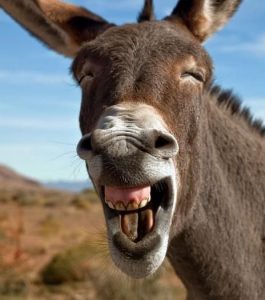Parshas Balak – Invitation to Murder

Were a donkey to suddenly develop the power of speech and address me, I would, I’m quite sure, be flabbergasted.
Faced with just such an asinine address, though, Bil’am isn’t struck silent and doesn’t collapse in shock. In fact, he seems entirely unfazed, and simply reacts to his donkey’s protest — “What have I done to you that you struck me these three times?” — by responding “Because you mocked me!” (Bamidbar 22:28-29).
What occurs to me as a possible explanation of his nonchalance is that he had become so oblivious to the difference between animals and humans — and indeed related to his beast as a partner in life — that the shock factor simply wasn’t there. True, the donkey had never spoken before, but maybe the animal simply hadn’t had anything to say until then.
The view of man as a mere fur-less ape is evident, too, at the end of the parsha, where the idolatry of Ba’al Pe’or celebrates the base physical functions that humans and lower creatures share in common.
The idea that humans are a mere subset of the animal kingdom has been taken by celebrated “ethicist” Peter Singer to its logical conclusion. Human infants, he has said, are “neither rational nor self-conscious,” and so, “The life of a newborn is of less value than the life of a pig, a dog or a chimpanzee.”
Equating humans and animals, which is common in our times as well as in ancient ones, isn’t just a means of legitimating debauchery.
It is nothing less, when truly internalized, than a prelude to murder.
© 2021 Rabbi Avi Shafran




Recent Comments